October 09, 2024
Farm 101: Cultivating connection between land & table
Middle school students in the Farm 101 Skills Incubator class recently had an unforgettable experience—visiting Oak Ridge Dairy, one of the largest working dairy farms in the region, as part of their curriculum. Led by their Middle School art teacher, Katherine Nicholson, a passionate farmer herself, this hands-on experience aimed to deepen students’ understanding of where food comes from and the challenges faced by modern agriculture.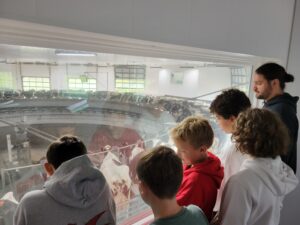
For Nicholson, who juggles farm life and teaching, the idea for Farm 101 started from her own personal experiences. Nicholson raises three types of sheep (Shropshire, South Down, and Oxfords), four beef cows, feeder pigs, and laying hens. She noticed how many students have a disconnect between their everyday meals and the hard work behind the production of food. “We’re moving further and further away from where our food comes from,” she said, noting how easily people assume food will always be available at grocery stores. COVID-19 supply chain disruptions heightened her awareness of the need to educate students on agriculture’s complexities.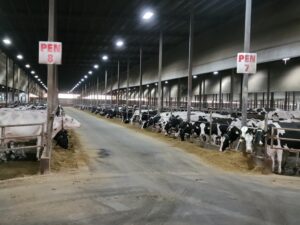
The visit to Oak Ridge Dairy in Ellington was a massive eye-opener for the 14 students. They toured a facility that houses over 5,000 cows, witnessing the impressive scale of dairy production. The farm milks more than 2,000 cows three times a day, running 24/7, with four tanker trucks of milk leaving the farm daily. The students were in awe as they observed the milking process and learned about the advanced technology the farm uses, including a methane digester that produces methane gas, which is sent to the Midwest to power houses and cars. The manure produced at the farm is also liquefied to fertilize crops as well as dehydrated for bedding.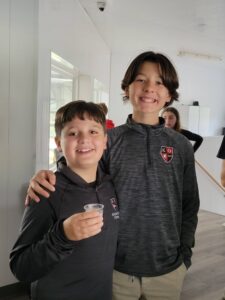
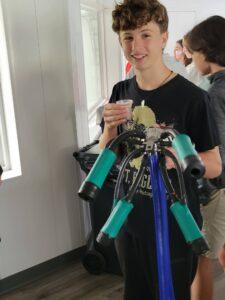
Despite the wonder, the visit also raised questions and conversations about the controversies surrounding large-scale dairy farming, particularly the practice of separating calves from their mothers. Nicholson emphasized that while Oak Ridge is a family-run farm that has grown into a significant operation, it represents an agricultural industry that sparks debate on both sides. “This farm has some cool, modern things that I wanted the students to see,” she said. “Some modern technology hopefully debunks some of the issues with farming.” Students are encouraged to explore these debates as part of their research projects on dairy and agricultural issues. As part of the class, the students will create a public service announcement to dispel the myths and share facts about dairy.
Farm 101 isn’t just about dairy, however. Throughout the school year, the other sections of this Skills Incubator class will cover various aspects of farming, from plant-based agriculture to the politics of meat consumption. Nicholson’s passion for connecting students with the land is evident, and she stresses that her role is not to proselytize but to offer information to develop the students’ research skills. “Some of the skills that the students are learning is how to research, how to get the facts, and how to make those choices with the facts they trust,” she said. Upcoming units will feature trips to other local farms, including one focused on plant agriculture and the journey of produce from seed to grocery store. Eventually, Nicholson hopes to bring in experts to discuss innovative topics like hydroponics and sustainable farming methods. 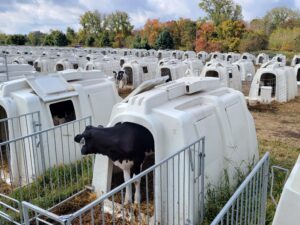
“I hope they take away a sense of connection to the food chain,” Nicholson said, “and feel empowered to make some decisions on how they eat and what they fuel themselves with.” The class encourages students not only to observe and learn but also to think critically about the impact of agriculture on their daily lives.
After touring the farm, one student said, “I never knew how much went into just a single gallon of milk.”
Through Farm 101, Nicholson hopes that the students come away with practical research skills and a deeper appreciation for the effort, challenges, and care that go into providing food for society. And, perhaps, some of them will be inspired to think about agriculture in new ways.
